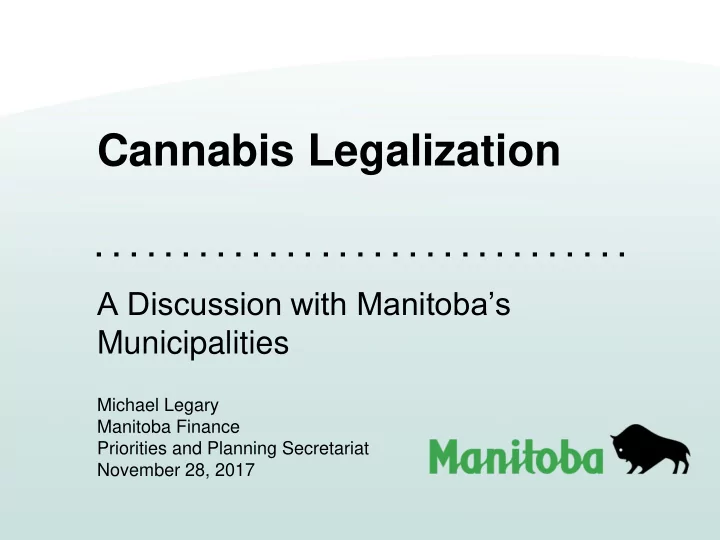

Cannabis Legalization . . . . . . . . . . . . . . . . . . . . . . . . . . . . . . . A Discussion with Manitoba’s Municipalities Michael Legary Manitoba Finance Priorities and Planning Secretariat November 28, 2017
July 1, 2018: It’s not just Canada Day • This is the Federal Government’s intended date for legalized production, sale and consumption of cannabis in Canada • Provinces / territories are responsible for regulatory guidance relating to cannabis production and distribution – The Cannabis Harm Prevention Act was passed in June 2017 – An RFP was released on November 7 for Manitoba’s Retail Cannabis Stores
Manitoba’s Cannabis Framework • The Liquor and Gaming Authority (LGA) will regulate the purchase, storage, distribution and retail of cannabis • Manitoba Liquor and Lotteries (MBLL) will secure and track supply of cannabis sold in Manitoba • The private sector will operate retail locations
Why this approach? • Manitoba’s objective is to eliminate the black market, keep cannabis out of the hands of youth, and create new opportunities in the marketplace – Public sector’s role in the industry will ensure safety – Private sector’s role will ensure competitiveness and accessibility
Short term activity (immediate) • RFP closes December 22, 2017 with initial Retail Cannabis Stores to open July 2, 2018 – MBLL and Growth, Enterprise and Trade (GET) developing MOUs to secure supply from Licensed Producers for the Manitoba market – GET developing retailer agreements – MBLL refining its supply chain management – LGA revising its regulatory framework and licensing regime
Mid term vision (post July 2, years 1-3) • MBLL/GET to monitor equilibrium of supply and demand • Allow for product differentiation through branding • Federal government’s regulatory framework for edibles and derivatives to be put in place
Long term vision (years 3-5+) • Competitive mix of large, medium and small Licensed Producers • Extraction and processing markets fully developed • Export Manitoba grown / manufactured products to other provinces
Municipal considerations • Informal / media-derived municipal feedback to date has focused on the impact of retail cannabis – Zoning (ex.: permitted locations) – Permits/licensing (ex.: operating hours) – Advertising/signage (ex.: size, content) – Policing and public safety – Local option – Revenue (through taxes)
For your consideration • What about the economic impacts of cannabis? – Retail cannabis stores must get supply from Licensed Producers through MBLL – Health Canada regulates Licensed Producers – Licensed Producers may want to operate in your municipality • It’s industrial agriculture • It’s manufacturing – of dried bud, of oil, and using cannabis by-products (ex.: unused plant in textile production) • These raise notable economic opportunity
Illicit cannabis is in our communities • One of Manitoba’s primary goals is to displace black market cannabis through legalization • GOAL: Within in 2 years, 90% of Manitobans can access legal cannabis in 30 minutes or less • GOAL: Within 2 years, legal cannabis has a 50% market share
Unlike black market cannabis, legal cannabis is tested for: • THC and CBD content (chemicals that produce a high) • Aflatoxins (a toxin produced by black mould) • Heavy metals (ex.: lead, mercury, cadmium) • Microbiologic (ex.: bacteria, yeast, mould, E.coli, salmonella, bile tolerant gram negative bacteria) • Staphylococcus, Pseudomonas, Pesticides • Moisture content recorded and visually inspected to ensure it's free from foreign matter
QUESTION: How do – or how can - municipalities support the province’s goals around: – Disrupting the black market – Access to legal product – Economic development while responding to community concerns about youth safety and public health?
Recommend
More recommend